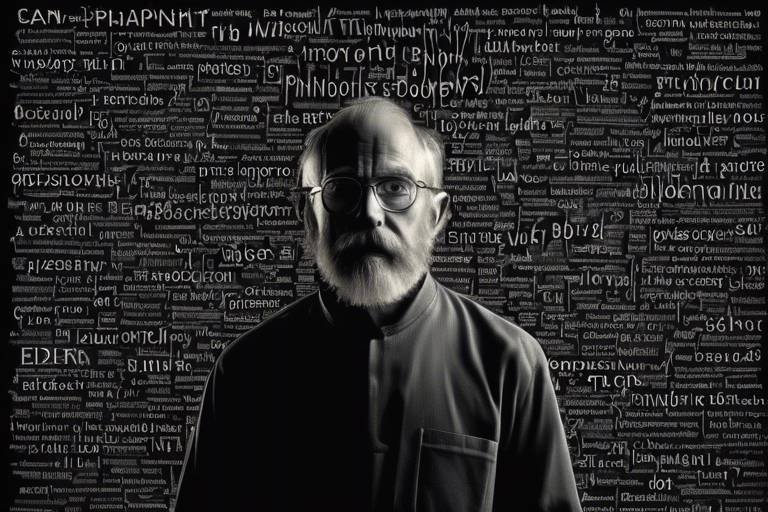The role of Philosophy in Particle Physics
Have you ever pondered the mysteries of the universe and found yourself wondering about the very fabric of reality? Philosophy and particle physics are two realms that, at first glance, might seem worlds apart. However, they are intricately intertwined, each influencing the other in profound ways. This article explores the intersection of these fascinating fields, shedding light on how philosophical inquiry shapes our understanding of fundamental particles and the nature of reality itself.
To grasp the significance of philosophy in particle physics, we must first appreciate the historical context. Since the dawn of scientific inquiry, philosophers have wrestled with questions about existence, knowledge, and the universe. As particle physics evolved, it became increasingly clear that philosophical ideas were not just ancillary thoughts but pivotal components that shaped key theories and concepts. Think of it as a dance between two partners—each step taken in philosophy has influenced the rhythm of scientific discovery, leading to groundbreaking theories about the smallest constituents of matter.
As we dive into the realm of quantum mechanics, the philosophical questions become even more profound. Quantum mechanics isn't just about particles behaving in strange and unexpected ways; it challenges our very notions of reality. For instance, consider the role of the observer. In the quantum world, the act of observation can alter the state of a particle. This leads to tantalizing questions: Does reality exist independently of our observation? Or are we, in some sense, creators of reality through our consciousness? Such inquiries challenge the traditional notions of determinism and causality, inviting us to reconsider what we think we know about the universe.
One of the most riveting debates in quantum mechanics is the clash between determinism and indeterminism. On one hand, determinism posits that every event is predetermined by preceding events, while indeterminism suggests that randomness plays a fundamental role in the universe. This philosophical scrutiny not only informs our understanding of physical phenomena but also raises existential questions about free will and the nature of existence itself. Are we mere puppets in a deterministic universe, or do we possess the power to shape our destinies?
Delving deeper, we encounter the observer effect, a concept that has sparked intense philosophical discussions. When a measurement is made, it seems to influence the outcome, prompting inquiries into the nature of consciousness. What does it mean to observe? Are we merely passive witnesses to reality, or are we active participants? The implications of these questions extend far beyond particle physics, touching on the very essence of what it means to be human.
As we explore different interpretations of quantum mechanics, such as the Copenhagen interpretation and the Many-Worlds interpretation, we see how philosophical implications arise from varying understandings of quantum behavior. Each interpretation presents a unique perspective on reality, highlighting the rich tapestry of thought that philosophy contributes to the scientific discourse. It’s like looking at a painting from different angles; each viewpoint reveals new colors and shapes, deepening our appreciation of the artwork.
The metaphysical implications of particle physics further challenge our understanding of existence and identity. What does it mean to be a fundamental entity in a universe composed of particles that can behave both as waves and as particles? This question invites philosophical debates about the nature of reality and the essence of being itself. It’s a puzzle that philosophers and physicists alike continue to unravel, each thread revealing deeper layers of understanding.
As we transition to the nature of scientific theories, we find that philosophy of science plays a crucial role in shaping our comprehension of particle physics. The structure of scientific theories raises questions about theory confirmation, falsification, and the role of theoretical entities. For instance, are entities like quarks and leptons real, or are they merely convenient constructs? This debate between realism and anti-realism is central to our understanding of the universe and our place within it.
Moreover, models in particle physics serve as vital tools for grappling with complex phenomena. These models not only help scientists make predictions but also raise philosophical questions about the relationship between models, reality, and scientific representation. Are models mere simplifications of a more complex reality, or do they hold intrinsic value in their own right? This inquiry reflects the ongoing dialogue between philosophy and science, illustrating how each field enriches the other.
- How does philosophy influence scientific inquiry? Philosophy encourages critical thinking and helps frame the questions scientists ask, guiding the direction of research and inquiry.
- What are the main philosophical questions in quantum mechanics? Key questions include the nature of reality, the role of the observer, and the implications of determinism versus indeterminism.
- Why are models important in particle physics? Models help simplify complex phenomena, allowing scientists to make predictions and understand the underlying principles of particle interactions.
- Can philosophical debates affect scientific theories? Yes, philosophical discussions can challenge existing theories and inspire new ways of thinking about fundamental concepts in physics.

The Historical Context
The relationship between philosophy and particle physics has a rich and intricate history that dates back centuries. Philosophers and scientists alike have grappled with fundamental questions about the nature of reality, existence, and the universe. In fact, many of the foundational concepts in particle physics were heavily influenced by philosophical inquiry. For instance, the early Greek philosophers, such as Democritus and Leucippus, proposed the idea of atoms as indivisible particles, laying the groundwork for modern atomic theory.
Fast forward to the 17th century, and we see the likes of René Descartes, who introduced a mechanistic view of the universe. His philosophy emphasized a deterministic universe governed by laws of nature, which set the stage for later scientific developments. The Enlightenment period further propelled these ideas, with philosophers like David Hume questioning causality and the nature of knowledge, which would eventually influence the interpretations of quantum mechanics.
As we moved into the 20th century, the advent of quantum mechanics brought a seismic shift in our understanding of particles and their behavior. The philosophical implications of this new science were profound. For instance, the work of Niels Bohr and Werner Heisenberg introduced concepts that challenged classical notions of reality. The famous Heisenberg Uncertainty Principle questioned the idea of precise measurements, suggesting that at a fundamental level, reality is not as straightforward as we once thought.
Throughout history, the interplay between philosophical ideas and scientific advancements has been evident. The following table summarizes key philosophers and their contributions that have shaped particle physics:
| Philosopher | Contribution | Era |
|---|---|---|
| Democritus | Proposed the atomic theory of matter. | 5th Century BC |
| René Descartes | Introduced mechanistic philosophy; emphasized determinism. | 17th Century |
| David Hume | Questioned causality and the nature of knowledge. | 18th Century |
| Niels Bohr | Developed the Copenhagen interpretation of quantum mechanics. | 20th Century |
| Werner Heisenberg | Formulated the Uncertainty Principle. | 20th Century |
As we can see, the evolution of particle physics has been deeply intertwined with philosophical thought. Each philosophical inquiry has not only shaped scientific theories but also provided a framework for understanding complex phenomena. The questions raised by these thinkers continue to resonate today, prompting ongoing discussions about the nature of reality and our place within it. It’s fascinating to consider how far we’ve come, yet how many questions remain unanswered.
In conclusion, the historical context of philosophy in relation to particle physics is not just a backdrop; it is a vital component that continues to influence our understanding of the universe. As we delve deeper into the realms of particle physics, we find ourselves continuously challenged to reflect on the philosophical implications of our discoveries, ensuring that the dialogue between these two fields remains as dynamic as ever.

Philosophical Questions in Quantum Mechanics
Quantum mechanics isn't just a set of mathematical equations and experimental results; it's a profound realm that forces us to confront some of the most challenging philosophical questions about the nature of reality. Have you ever wondered what happens when we observe a particle? Or how can something exist in multiple states at once? These inquiries are not merely academic; they strike at the very heart of how we understand the universe. The implications of quantum mechanics challenge our traditional views on determinism and causality, raising questions that resonate far beyond the confines of physics.
At the core of quantum mechanics lies the observer effect. This phenomenon suggests that the act of measurement can fundamentally alter the state of a system. Imagine trying to catch a glimpse of a shy cat hiding under the bed; the moment you peek, it scurries away. Similarly, in quantum mechanics, the moment we try to observe a particle, we change its behavior. This leads us to ponder: does reality exist independently of our observation, or is it shaped by our very act of looking? Such questions don't just tickle the intellect; they plunge us into a philosophical abyss where the lines between subjectivity and objectivity blur.
The debate between determinism and indeterminism in quantum mechanics is like a philosophical tug-of-war. Determinists argue that every event or state of affairs, including every human action, is the outcome of preceding events in accordance with the natural laws. On the flip side, indeterminists embrace the idea that randomness is an intrinsic part of the universe. This raises the tantalizing question: if the universe is fundamentally indeterminate, what does that mean for our understanding of free will? Are our choices merely illusions in a chaotic cosmos? This clash of perspectives invites us to reconsider our assumptions about causality and the predictability of events.
Diving deeper into the observer effect, we find ourselves grappling with the implications of consciousness in quantum mechanics. Could it be that consciousness plays a pivotal role in shaping reality? Some interpretations suggest that the act of observation collapses a particle's wave function, determining its state. This leads to philosophical inquiries about the nature of consciousness itself. Are we merely passive observers in a grand cosmic play, or do we actively participate in the unfolding of reality? The interplay between the observer and the observed invites a rich tapestry of philosophical exploration, challenging us to rethink our place in the universe.
The myriad interpretations of quantum mechanics, such as the Copenhagen interpretation and the Many-Worlds interpretation, further illustrate the philosophical implications of quantum behavior. The Copenhagen interpretation posits that particles do not have definite properties until measured, while the Many-Worlds interpretation suggests that every possible outcome of a quantum event actually occurs in a vast multiverse. Each interpretation offers a different lens through which to view reality, prompting us to consider: what does it mean for something to exist? Are there parallel realities coexisting with our own? These questions are not just theoretical musings; they challenge the very fabric of our understanding of existence.
In summary, the philosophical questions raised by quantum mechanics are not merely side notes in the grand narrative of physics; they are integral to our understanding of reality itself. As we delve deeper into the quantum realm, we find ourselves standing at the crossroads of science and philosophy, where the mysteries of existence beckon us to explore further.
- What is the observer effect in quantum mechanics? The observer effect refers to changes that the act of observation can make on a quantum system, suggesting that measurement influences the state of particles.
- How does quantum mechanics challenge traditional views of reality? Quantum mechanics introduces indeterminism and questions the objective existence of particles, leading to philosophical debates about the nature of reality.
- What are the main interpretations of quantum mechanics? The two prominent interpretations are the Copenhagen interpretation, which posits that properties are not definite until measured, and the Many-Worlds interpretation, which suggests that all possible outcomes exist in parallel universes.

Determinism vs. Indeterminism
When we dive into the captivating world of quantum mechanics, we stumble upon a riveting debate that has puzzled philosophers and scientists alike: . At its core, this debate questions whether the universe operates on a strict set of rules, where every event is predetermined, or if there’s an element of randomness that plays a pivotal role in the unfolding of events. Imagine a grand cosmic clock, ticking away with precision, where every tick is a moment in time that has been scripted long before it happens. This is the essence of determinism, where the universe is akin to a well-oiled machine, and every particle's behavior can be predicted if we only had enough information.
On the flip side, we have indeterminism, which suggests that not everything is set in stone. Picture tossing a coin: while we can predict that it will land either heads or tails, we cannot determine the outcome of a single toss due to the inherent randomness involved. In the quantum realm, this randomness is not just a byproduct of our ignorance; it is a fundamental aspect of reality. The famous example of Heisenberg's Uncertainty Principle encapsulates this idea, demonstrating that certain pairs of physical properties, like position and momentum, cannot be precisely measured simultaneously. This principle challenges the deterministic view by suggesting that at a fundamental level, the universe is unpredictable.
To further illustrate the contrast between these two philosophies, let’s consider a few key aspects:
| Aspect | Determinism | Indeterminism |
|---|---|---|
| Nature of Events | Predetermined and predictable | Random and unpredictable |
| Philosophical Implications | Free will is an illusion | Free will may exist |
| Scientific Perspective | Classical physics supports determinism | Quantum physics supports indeterminism |
This debate doesn't just remain confined to academic discussions; it has profound implications for our understanding of the universe and our place within it. If determinism holds true, then every action we take is merely a result of preceding causes, suggesting that our sense of free will is just an illusion. Conversely, if indeterminism prevails, it opens the door to the possibility of free will and the notion that we can influence the course of events in our lives.
As we navigate through the complexities of particle physics, the questions surrounding determinism and indeterminism compel us to reflect on our understanding of reality. Are we mere spectators in a predetermined play, or do we have the ability to shape our destinies? This philosophical inquiry not only enriches our grasp of quantum mechanics but also challenges us to consider the broader implications of our existence.
- What is determinism? Determinism is the philosophical belief that all events are determined completely by previously existing causes.
- What is indeterminism? Indeterminism is the view that not all events are causally determined and that there is an element of randomness in the universe.
- How does quantum mechanics relate to this debate? Quantum mechanics introduces elements of unpredictability, suggesting that at a fundamental level, outcomes cannot always be determined.
- What are the implications for free will? If determinism is true, free will may be an illusion; if indeterminism is true, it could imply that individuals have some degree of agency in their choices.

The Role of the Observer
When we dive into the deep waters of quantum mechanics, we stumble upon a fascinating conundrum: the role of the observer. It's like stepping into a surreal painting where the act of looking changes the very essence of what we see. Imagine a world where simply observing a phenomenon alters its outcome—this is not just a philosophical musing but a fundamental aspect of quantum physics. The observer effect posits that the act of measurement influences the state of a quantum system, leading to intriguing questions about reality itself.
To put it simply, consider the famous thought experiment known as Schrödinger's cat. In this scenario, a cat is placed in a sealed box with a radioactive atom that has a 50% chance of decaying within an hour. If the atom decays, it triggers a mechanism that kills the cat; if it doesn’t, the cat lives. Until we open the box and observe the cat, it exists in a superposition of being both alive and dead. This paradox not only highlights the peculiarities of quantum mechanics but also emphasizes the pivotal role we play as observers. Our decision to look transforms the situation from potentiality to actuality.
The philosophical implications of this concept are profound. It challenges our traditional understanding of reality, suggesting that it is not merely objective but intertwined with consciousness. Are we mere spectators in the grand theater of the universe, or do we actively shape it with our observations? This question invites us to ponder the nature of consciousness itself and its relationship with the physical world. The observer is not just a passive entity; rather, they are an integral part of the fabric of reality.
Moreover, the observer effect raises further inquiries about the limits of knowledge. If our observations can alter outcomes, how can we trust our measurements? This uncertainty leads to a philosophical dilemma: is it possible to know anything with absolute certainty in the quantum realm? The answer, it seems, is a resounding "maybe." This uncertainty is not just a feature of quantum mechanics; it extends into the philosophical domain, prompting debates about the nature of knowledge and existence.
In light of these discussions, several key philosophical questions emerge:
- Does the observer create reality, or merely reveal it?
- What is the relationship between consciousness and the physical world?
- Can we ever truly know the state of a quantum system without influencing it?
Ultimately, the role of the observer in quantum mechanics invites us to reconsider our understanding of reality. It blurs the lines between subject and object, suggesting that we are not just passive witnesses but active participants in the unfolding drama of existence. As we continue to unravel the mysteries of particle physics, one thing remains clear: the observer is as much a part of the equation as the particles themselves.
- What is the observer effect in quantum mechanics? The observer effect refers to changes that the act of observation can make on a quantum system, highlighting that measurement influences the behavior of particles.
- How does the observer influence reality? The act of observing a quantum system can determine its state, suggesting that consciousness may play a role in shaping reality.
- What are some implications of the observer effect? The observer effect raises questions about the nature of knowledge, reality, and the relationship between consciousness and the physical world.

Interpretations of Quantum Mechanics
The realm of quantum mechanics is not just a playground for physicists; it is a battleground of ideas and interpretations that challenge our very understanding of reality. At its core, quantum mechanics presents us with phenomena that defy our classical intuitions. Take, for instance, the famous double-slit experiment, where particles behave like waves and can exist in multiple states at once. This perplexity gives rise to several interpretations, each offering a unique lens through which to view the quantum world.
One of the most prominent interpretations is the Copenhagen interpretation, which posits that quantum particles do not have definite properties until they are measured. In this view, the act of observation plays a crucial role in determining the state of a particle. Imagine a coin spinning in the air; it is neither heads nor tails until someone catches it. This interpretation raises fascinating questions: Does reality exist independently of our observation, or is it contingent upon our engagement with it?
On the other hand, we have the Many-Worlds interpretation, which suggests that all possible outcomes of quantum measurements actually occur, but in separate, branching universes. This idea can be likened to a tree with countless branches, each representing a different possible outcome. It challenges our understanding of reality by proposing that every decision creates a new universe. If you think about it, this interpretation implies that somewhere out there, there is a version of you who made a different choice this morning—perhaps choosing pancakes over waffles!
Then there's the de Broglie-Bohm theory, which introduces the concept of 'pilot waves' guiding particles along deterministic paths. This interpretation reintroduces a sense of realism to quantum mechanics, suggesting that particles have definite positions and velocities, even if we cannot observe them directly. It’s like having a hidden map that tells you where everything is, even when you can’t see it. This challenges the idea of randomness that pervades many other interpretations.
In addition to these, we also encounter the Objective Collapse theories, which propose that wave function collapse occurs spontaneously, independent of observation. This interpretation seeks to reconcile the peculiarities of quantum mechanics with a more classical understanding of reality, suggesting that particles have definite properties that can be revealed through specific conditions.
As we explore these interpretations, it becomes clear that they are not just academic musings; they have profound implications for our understanding of existence, consciousness, and the very fabric of reality. The debates surrounding these interpretations invite us to ponder questions like:
- What does it mean to observe something?
- Is there a reality independent of our perceptions?
- How does consciousness interact with the physical world?
These inquiries not only shape the field of particle physics but also resonate with philosophical discussions about the nature of existence. As physicists continue to probe the mysteries of the quantum world, the interpretations of quantum mechanics will remain a crucial area of exploration, challenging our deepest assumptions about reality.
- What is the Copenhagen interpretation? - It suggests that particles only have definite properties when measured.
- What does the Many-Worlds interpretation propose? - It posits that all possible outcomes occur in separate universes.
- How does the de Broglie-Bohm theory differ from other interpretations? - It introduces pilot waves, suggesting particles have definite paths.
- What are Objective Collapse theories? - They propose that wave function collapse happens spontaneously, independent of observation.

Metaphysical Implications
The realm of particle physics is not just about tiny particles and their interactions; it opens a Pandora's box of metaphysical questions that challenge our very understanding of existence. When we delve into the nature of particles, we are not just asking what they are, but also probing deeper into the essence of reality itself. What does it mean to exist? Are particles truly the fundamental building blocks of the universe, or are they merely constructs of our understanding? These questions echo through the corridors of philosophy and science alike, creating a fascinating interplay between the two fields.
At the heart of these metaphysical implications lies the concept of identity. In particle physics, we often categorize particles into families, such as quarks and leptons, each with unique properties. But what does it mean for a particle to have identity? Is a proton simply a collection of quarks, or does it possess an identity that transcends its constituent parts? This inquiry leads us to consider the nature of wholes and parts, raising questions about whether the whole is greater than the sum of its parts, a classic philosophical debate.
Furthermore, the very nature of particles poses intriguing questions about existence itself. Are particles real entities that exist independently of our observation, or are they merely manifestations that come into being through measurement? This dilemma touches on the philosophical concept of realism versus anti-realism. While realism asserts that particles exist regardless of our observation, anti-realism suggests that their existence is contingent upon our ability to measure them. This philosophical battleground invites us to reconsider our assumptions about reality and existence.
In addition, the implications of particle physics extend into the realm of causality. Traditional views of causation suggest a linear progression of events—A causes B, B causes C, and so forth. However, quantum mechanics introduces a level of complexity that challenges this linearity. Events at the quantum level can appear random, leading to a philosophical inquiry into whether causality is a fundamental aspect of reality or merely an emergent property of our macroscopic world. This invites us to ponder whether our understanding of cause and effect is merely a convenient narrative we impose on the universe.
Ultimately, the metaphysical implications of particle physics compel us to confront our understanding of reality. They challenge us to ask profound questions about the nature of existence, identity, and causality. As we continue to explore the subatomic realm, we find that the answers may not be as clear-cut as we once believed. Instead, we may discover that the universe is a complex tapestry woven from both scientific inquiry and philosophical reflection, where each thread contributes to our understanding of the cosmos.
- What are the main metaphysical questions raised by particle physics?
Particle physics raises questions about existence, identity, and causality, challenging our traditional views of reality. - How do particles relate to philosophical concepts?
Particles can be seen as both real entities and constructs of our understanding, leading to debates between realism and anti-realism. - What role does observation play in particle physics?
Observation in quantum mechanics can influence the behavior of particles, leading to philosophical inquiries about the nature of reality. - Are particles truly fundamental?
The question of whether particles are fundamental entities or combinations of smaller components is a significant metaphysical debate.

The Nature of Scientific Theories
The nature of scientific theories in particle physics is a fascinating and complex topic that delves into how we understand the universe at its most fundamental level. Scientific theories are not merely collections of facts but are structured frameworks that help us interpret and predict phenomena. In the realm of particle physics, these theories often challenge our intuitions and push the boundaries of what we consider to be reality. One of the key aspects of scientific theories is their ability to evolve. As new discoveries are made, theories are refined or even replaced, which leads us to ponder: how do we know when a theory is valid?
To address this question, we can look at the concepts of confirmation and falsification. Confirmation refers to the process of gathering evidence that supports a theory, while falsification involves finding evidence that disproves it. A robust scientific theory should be able to withstand rigorous testing and should be open to revision or rejection based on new data. This dynamic nature of scientific theories is what makes the field of particle physics so exciting; it is a constantly evolving landscape where our understanding of the universe is perpetually refined.
Moreover, the role of theoretical entities in particle physics raises significant philosophical questions. Are entities like quarks and leptons real, or are they simply useful constructs that help us make sense of our observations? This debate falls into the realm of realism versus anti-realism. Realists argue that theoretical entities exist independently of our observations, while anti-realists contend that these entities are merely tools for prediction and explanation. This dichotomy is not just academic; it influences how scientists approach their work and how they interpret their findings.
Another important aspect to consider is the use of models in particle physics. Models serve as essential tools for understanding complex phenomena, allowing scientists to visualize and manipulate concepts that are often beyond our direct experience. However, this raises philosophical questions about the relationship between models and reality. Are models accurate representations of the underlying reality, or do they merely provide a simplified view? This question leads us to ponder the limits of scientific representation and how much we can truly know about the universe.
In summary, the nature of scientific theories in particle physics is a rich tapestry woven with threads of confirmation, falsification, realism, and the role of models. Each of these elements contributes to our understanding of the universe, prompting us to continually question and refine our theories. The interplay between philosophy and particle physics not only enriches our scientific inquiry but also deepens our appreciation for the complexities of existence itself.
- What is the difference between confirmation and falsification in scientific theories?
Confirmation involves gathering evidence that supports a theory, while falsification seeks evidence that disproves it. - Are theoretical entities like quarks real?
This is a subject of debate between realists, who believe they exist independently, and anti-realists, who see them as useful constructs. - How do models aid in our understanding of particle physics?
Models help visualize and simplify complex phenomena, but they also raise questions about the accuracy of scientific representation.

Realism vs. Anti-Realism
The debate between realism and anti-realism in the realm of particle physics is not just a dry academic discussion; it’s a vibrant clash of ideas that shapes how we interpret the universe around us. At its core, realism posits that the entities described by our scientific theories—like quarks and leptons—exist independently of our observations or theories. This perspective aligns with the intuitive notion that the universe is an objective reality waiting to be discovered. Think of it like a hidden treasure chest buried in the ground; realists believe that with the right tools and enough digging, we can uncover its contents, regardless of whether anyone is looking at it.
On the flip side, anti-realism challenges this assumption, suggesting that these theoretical entities might not exist outside of our scientific models. Instead, they are seen as useful constructs that help us make sense of observations but do not correspond to anything tangible in the universe. Imagine a map of a city: while it provides valuable insights and directions, it’s not the city itself. Anti-realists argue that our theories are merely maps of reality, not reality itself. This perspective raises intriguing questions about the nature of scientific inquiry: Are we merely creating elaborate fictions that help us navigate the complexities of the physical world?
To further illustrate the nuances of this debate, consider the following table that outlines key differences between realism and anti-realism in particle physics:
| Aspect | Realism | Anti-Realism |
|---|---|---|
| Existence of Entities | Entities exist independently of observation. | Entities are constructs useful for explaining phenomena. |
| Nature of Theories | Theories aim to describe an objective reality. | Theories are tools for organizing experience. |
| Truth of Theories | Theories can be true or false based on their correspondence to reality. | Theories are judged by their usefulness and coherence. |
This ongoing discussion has profound implications for how we understand the fundamental particles that make up our universe. For instance, if we adopt a realist stance, we might invest significant resources into detecting and confirming the existence of theoretical particles, believing they are real and waiting to be unveiled. Conversely, an anti-realist perspective might lead us to focus on refining our models and improving their predictive power, regardless of whether the underlying entities exist in a physical sense.
Ultimately, the realism versus anti-realism debate invites us to reflect on the nature of scientific knowledge itself. It challenges us to consider: What does it mean to "know" something in the realm of particle physics? Is knowledge a reflection of an external reality, or is it a product of our conceptual frameworks? As we continue to explore the depths of particle physics, these philosophical inquiries will remain at the forefront, guiding our understanding of the universe and our place within it.
- What is realism in particle physics? Realism is the belief that the entities described by scientific theories exist independently of our observations.
- What is anti-realism? Anti-realism suggests that theoretical entities are useful constructs rather than actual entities that exist independently.
- Why does the realism vs. anti-realism debate matter? This debate influences how scientists interpret data and develop theories in particle physics, affecting the direction of research and our understanding of reality.

The Role of Models in Physics
This article explores the intersection of philosophy and particle physics, highlighting how philosophical inquiry shapes our understanding of fundamental particles and the nature of reality.
Examining the historical relationship between philosophy and physics reveals how philosophical ideas have influenced the development of particle physics over time, shaping key theories and concepts.
Quantum mechanics raises profound philosophical questions about the nature of reality, observation, and the role of the observer, challenging traditional notions of determinism and causality.
The debate between determinism and indeterminism in quantum mechanics invites philosophical scrutiny, questioning whether events are predetermined or if randomness plays a fundamental role in the universe.
Philosophical discussions about the observer effect in quantum mechanics explore how measurement influences reality, prompting inquiries into the nature of consciousness and its relationship with physical phenomena.
Various interpretations of quantum mechanics, such as the Copenhagen and Many-Worlds interpretations, illustrate the philosophical implications of different understandings of quantum behavior and reality.
The metaphysical implications of particle physics challenge our understanding of existence, identity, and the nature of particles, prompting philosophical debates about what it means to be a fundamental entity.
Philosophy of science examines the nature and structure of scientific theories in particle physics, addressing issues of theory confirmation, falsification, and the role of theoretical entities.
Models in particle physics serve as crucial tools for understanding complex phenomena. They act as simplified representations of reality, allowing scientists to predict outcomes, test hypotheses, and visualize concepts that might otherwise be abstract or counterintuitive. For instance, consider how a weather model predicts storms or how a computer simulation can illustrate the behavior of particles in a collider experiment. These models are not just mere tools; they embody the interplay between theoretical constructs and empirical data.
However, the relationship between models and reality raises several philosophical questions. Are these models just useful fictions, or do they have a deeper ontological status? This leads us to consider the distinction between realism and anti-realism in physics. Realists argue that models correspond to actual entities in the universe, while anti-realists contend that models are merely instruments for organizing our experiences.
To illustrate the role of models in particle physics, let's take a look at some common types of models used in the field:
| Model Type | Description | Purpose |
|---|---|---|
| Standard Model | A theory that describes the electromagnetic, weak, and strong nuclear interactions. | To explain how fundamental particles interact. |
| Quantum Field Theory | A framework that combines classical field theory, special relativity, and quantum mechanics. | To describe the behavior of subatomic particles. |
| String Theory | A theoretical framework where point-like particles are replaced by one-dimensional strings. | To unify all fundamental forces of nature. |
These models allow physicists to explore scenarios that are otherwise impossible to observe directly. For example, in particle accelerators, scientists can recreate conditions similar to those just after the Big Bang. Through these models, we gain insights not only into the fundamental building blocks of matter but also into the very fabric of the universe itself.
- What is the importance of models in physics? Models help simplify complex systems and provide a framework for understanding and predicting physical phenomena.
- Are models in physics always accurate? While models are useful, they are simplifications of reality and may not capture every detail of the phenomena they represent.
- How do models contribute to scientific discovery? Models allow scientists to test hypotheses and explore theoretical scenarios, leading to new discoveries and advancements in understanding.
Frequently Asked Questions
- What is the relationship between philosophy and particle physics?
Philosophy and particle physics are intertwined in many ways. Philosophy helps us explore fundamental questions about reality, existence, and the nature of particles. It provides a framework for understanding the implications of theories in particle physics, shaping our comprehension of concepts like quantum mechanics and the behavior of fundamental particles.
- How does quantum mechanics challenge traditional philosophical views?
Quantum mechanics introduces profound philosophical dilemmas, particularly regarding determinism and causality. It raises questions about whether events are predetermined or if randomness is an inherent part of our universe. This challenges our traditional views about how we understand cause and effect, pushing us to rethink what we know about reality.
- What is the observer effect in quantum mechanics?
The observer effect refers to the phenomenon where the act of measurement influences the state of a quantum system. This raises philosophical inquiries about the role of consciousness and perception in shaping reality. It suggests that our observations can alter the very nature of what we are measuring, leading to deep questions about the relationship between the observer and the observed.
- What are the different interpretations of quantum mechanics?
There are several interpretations of quantum mechanics, including the Copenhagen interpretation and the Many-Worlds interpretation. Each has its own philosophical implications regarding the nature of reality and how we understand quantum behavior. These interpretations invite discussions about what it means for something to exist and how we perceive the universe around us.
- How do philosophical debates influence scientific theories?
Philosophical debates play a crucial role in shaping scientific theories in particle physics. Discussions around realism versus anti-realism, for example, question whether theoretical entities like quarks and leptons have real existence or are merely useful constructs. This influences how scientists approach theory confirmation and falsification in their research.
- What is the significance of models in particle physics?
Models are essential tools in particle physics, helping scientists understand complex phenomena. Philosophically, they raise questions about the relationship between models and reality, challenging us to consider how accurately these models represent the physical world. This ongoing dialogue is vital for advancing both scientific understanding and philosophical inquiry.



















